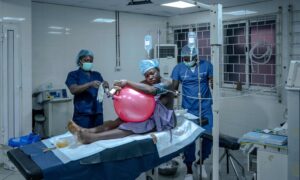
Despite having the largest economy in Africa, Nigeria also loses more women to death in childbirth than most other countries in the world. In 2020, about 82,000 Nigerian women died due to pregnancy-related complications, a slight improvement on the previous year, but an increase on previous decades.
The causes of death included severe haemorrhage, high blood pressure (pre-eclampsia and eclampsia), unsafe abortion and obstructed labour. Doctors and activists say high maternal mortality rates reflect a lack of trust in a broken public healthcare system and little political will to fix it.
The World Health Organization recommendation for a functioning healthcare system is one doctor for every 600 people; in Nigeria, the ratio is one for every 4,000-5,000 patients. The federal budget for healthcare in 2024 is 5% , a record high, but far short of the 15% suggested by the UN.
Most Nigerians live in areas without well-equipped medical centres or have to pay upfront for treatment. During pregnancy, women skip prenatal check-ups, choose traditional healers and often don’t resort to seeking professional medical help until it is too late. Nigeria’s rate of 1,047 deaths per 100,000 births in 2020 is the third-highest maternal mortality in Africa and far from the UN goal of 70 deaths per 100,000 to be reached globally by 2030.
Lawal Arinola, 31, arrived at the Lagos Island maternity hospital early in the morning. Her uterus was not contracting after a caesarean section at a private health centre the previous day. She was losing blood and had acute renal failure. The hospital lifts had been broken for months and ground-floor theatres were unavailable, so as she went into cardiac arrest she was carried on a stretcher to a second-floor operating room. An anaesthesiologist started heart massage, shouting for adrenaline to be delivered as the machine monitoring Arinola’s heart bleeped out a flat line.
It was five minutes before she was resuscitated and Dr Olusola Togunde and his team could perform an emergency hysterectomy. The room was hot and several times a nurse wiped sweat from Togunde’s forehead. He was checking for remaining sources of bleeding when the lights went out for the third time that day. In theory, every theatre in the hospital has a constant supply of energy from a generator, but this time the connection failed. The machines monitoring Arinola’s vital signs fell silent and the lights went off. Togunde made the post-operative stitches using the torch from a phone held by one of his assistants.
Despite all efforts of hospital staff, Arinola did not wake up from the surgery. The septic shock that she arrived with turned into multiple organ disfunction. She died in the hospital’s ICU eight days later.
